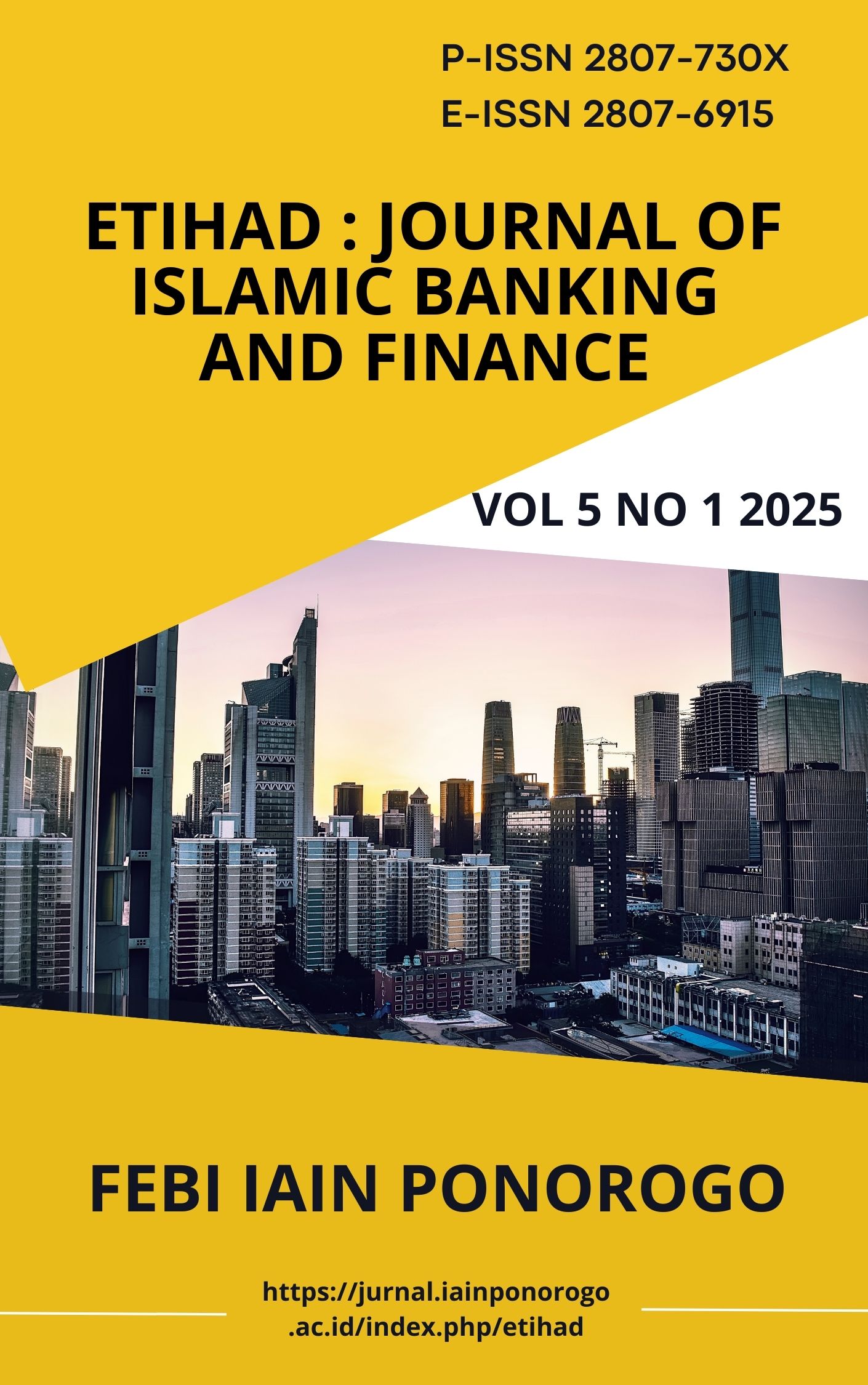Customer Engagement in Enhancing Customer Loyalty: Empirical Evidence Non-Muslim Customers of Bank Syariah Indonesia (BSI) KCP Tomoni
DOI:
https://doi.org/10.21154/etihad.v5i1.10427Keywords:
Attitudinal Attachment, Behavioral Attachment, Cognitive Attachment, Customer Engagement, LoyaltyAbstract
Introduction: One of the strategies implemented to engage customers is the application of the customer engagement concept. The purpose of this research is to analyze the customer engagement strategy's impact on the loyalty of non-Muslim customers at Bank Syariah Indonesia (BSI) KCP Tomoni. Research Methods: The research method employed in this study is qualitative research from a phenomenological perspective. The findings derived from in-depth interviews will then be analyzed using the Interpretative Phenomenological Analysis (IPA) method. Results: The implementation of customer engagement with the indicators of cognitive attachment, attitudinal attachment, and behavioral attachment can foster a sense of loyalty among non-Muslim customers towards BSI KCP Tomoni. Conclusion: The customer engagement strategy at BSI KCP Tomoni effectively enhances non-Muslim customer loyalty through cognitive, attitudinal, and behavioral dimensions. This study underscores the importance of inclusive and customer-centered approaches in Islamic banking to sustain loyalty across diverse segments.
References
Akhgari, M., & Bruning, E. R. 2024. How Attitudes Translate to Loyalty: An Integrative Model in Service Relationship Marketing. Journal of Relationship Marketing. https://doi.org/10.1080/15332667.2024.2368323
Bahri-Ammari, N., van Niekerk, M., ben Khelil, H., & Chtioui, J. 2016. The effects of brand attachment on behavioral loyalty in the luxury restaurant sector. International Journal of Contemporary Hospitality Management, 28(3), 559–585. https://doi.org/10.1108/IJCHM-10-2014-0508
Bayir, Aydan, and Tim Lomas. 2016. “Difficulties Generating Self-Compassion: An Interpretative Phenomenological Analysis.”
Brodie, R. J., Hollebeek, L. D., Jurić, B., & Ilić, A. 2011. Customer engagement: Conceptual domain, fundamental propositions, and implications for research. Journal of Service Research, 14(3), 252–271. https://doi.org/10.1177/1094670511411703
Hollebeek, Linda, D, Mark Glynn S, and Brodie. 2014. “Consumer Brand Engagement in Social Media: Conceptualization, Scale 2 Development and Validation.”
Lim, W. M., & Rasul, T. 2022. Customer engagement and social media: Revisiting the past to inform the future. Journal of Business Research, 148, 325–342. https://doi.org/10.1016/j.jbusres.2022.04.068
Li, W., & SU, C.-S. 2025. Impact of Emotional Attachment and Self-Brand Connection on Repurchase Behavior: The Mediating Role of Attitudinal Loyalty and Behavioral Loyalty. Journal of Management World, 2025(3), 76–83. https://doi.org/10.53935/jomw.v2024i4.1046
Mahayani, Odytri Caesar, Ismiarta Aknuranda, and Ari Kusyanti. 2019. “Pengaruh Customer Engagement Melalui Media Sosial terhadap Kepercayaan Merek (Studi Kasus : Instagram Shopee).” https://j-ptiik.ub.ac.id/index.php/j-ptiik/article/view/4920
Manggarani, C, A. 2018. The Role of Customer Engagement on Customer Loyalty: A Study at a Private Higher Education Institution. Hasanuddin Economics and Business Review. 2(1). 71-82
Marketing Science Institute. 2010. Marketing Research. Cambridge: MSI
Marta, Regi Erlan, Abror Abror, and Okki Trinanda. 2019. “Pengaruh Customer Engagement terhadap Loyalitas Nasabah dengan Kepuasan Pelanggan sebagai Variabel Intervening (Study Kasus pada Bank BRI Unit Belimbing Padang).” Jurnal Ecogen 2 (2): 156. https://doi.org/10.24036/jmpe.v2i2.6676.
Muhammad, D, A. 2007. Hukum Islam: Pengantar Ilmu Hukum Dan Tata Hukum Islam Di Indonesia.
Nur, A., Cahyani, D., Ningrum, N. K., 2024. Pengaruh customer engagement terhadap brand loyalty dengan brand attachment dan customer trust sebagai variabel intervening. Jurnal Manajemen Terapan Dan Keuangan (Mankeu), 13(04).
Nurhayati, N. 2018. Memahami Konsep Syariah, Fikih, Hukum dan Ushul Fikih. Jurnal Hukum Ekonomi Syariah, 2(2), 124-134. https://doi.org/10.26618/j-hes.v2i2.1620
Omran, W. 2021. Master in Marketing and Communication II Customer Engagement in Social Media Brand Community A Study of Fast-Food Facebook Brand Pages in Syria Constitution of the jury: President: Prof. Nuno Miguel Fortes Fonseca Santos.
Sashi, C.M. 2012. Customer Engagement, Buyer-Seller Relationships, and Social Media. Management Decision Journal. 50. http://dx.doi.org/10.1108/00251741211203551
Syahputra, Dicky. 2019. “Building Customer Engagement through Customer Experience, Customer Trust, and Customer Satisfaction in Kaligung Train Customers.” https://doi.org/10.15294/maj.v9i4.33958
Tuti, M., & Sulistia, V. 2022. The Customer Engagement Effect on Customer Satisfaction and Brand Trust and Its Impact on Brand Loyalty. Jurnal Manajemen Bisnis, 13(1), 1–15. https://doi.org/10.18196/mb.v13i1.12518
Van Doorn, J., dkk. 2010. Customer Engagement Behavior: Theoretical Foundations and Research Directions. Journal of Service Research. http://dx.doi.org/10.1177/1094670510375599
Willems, H. 2011. Customer-Driven Online Engagement : Transitioning into a Blueconomy. White Paper Customer-Driven Online.
Wiranti, Malisa Wahyu, and Hari Susanta Nugraha. 2018. “Analisis Strategi Customer Engagement terhadap Loyalitas pada PT. Nasmoco Magelang.” https://doi.org/10.14710/jiab.2017.14591
Downloads
Published
Issue
Section
License
Copyright (c) 2025 Hardianti Yusuf, Muh. Ginanjar, Mutiara Arlinda

This work is licensed under a Creative Commons Attribution-NonCommercial 4.0 International License.
Etihad: Journal of Islamic Banking and Finance allow the author(s) to hold the copyright without restrictions and allow the author(s) to retain publishing rights without restrictions, also the owner of the commercial rights to the article is the author.







